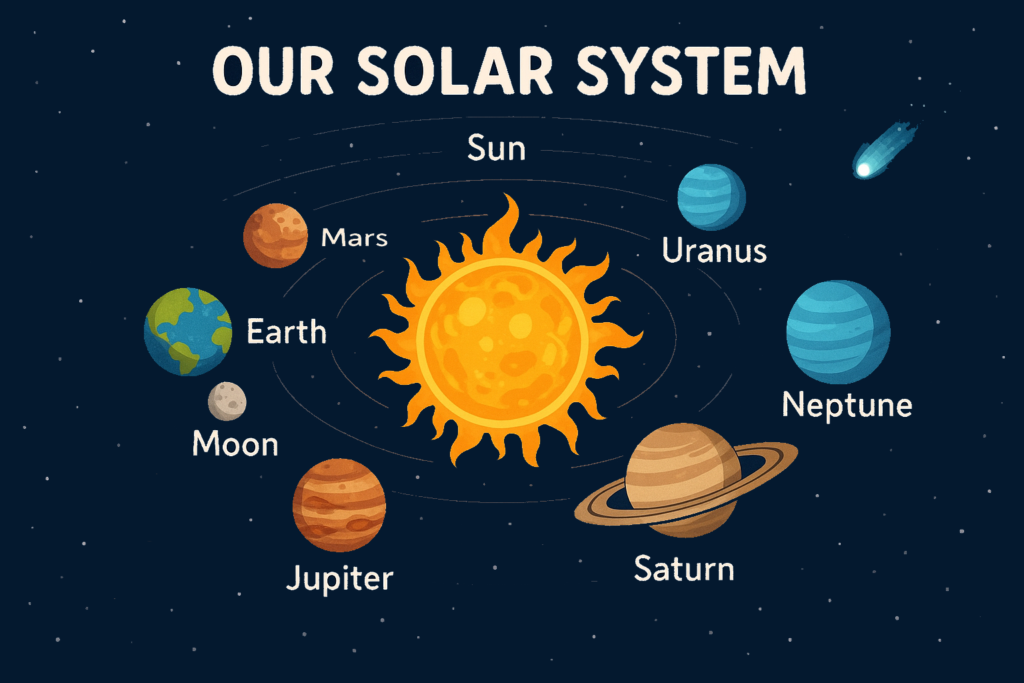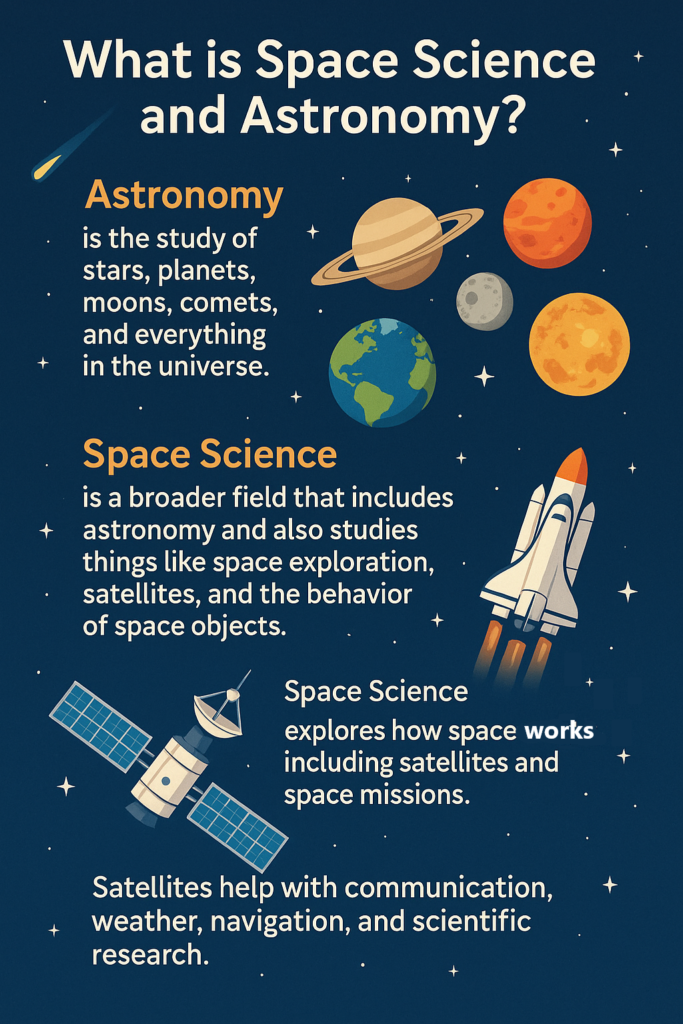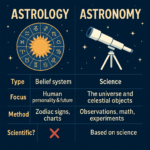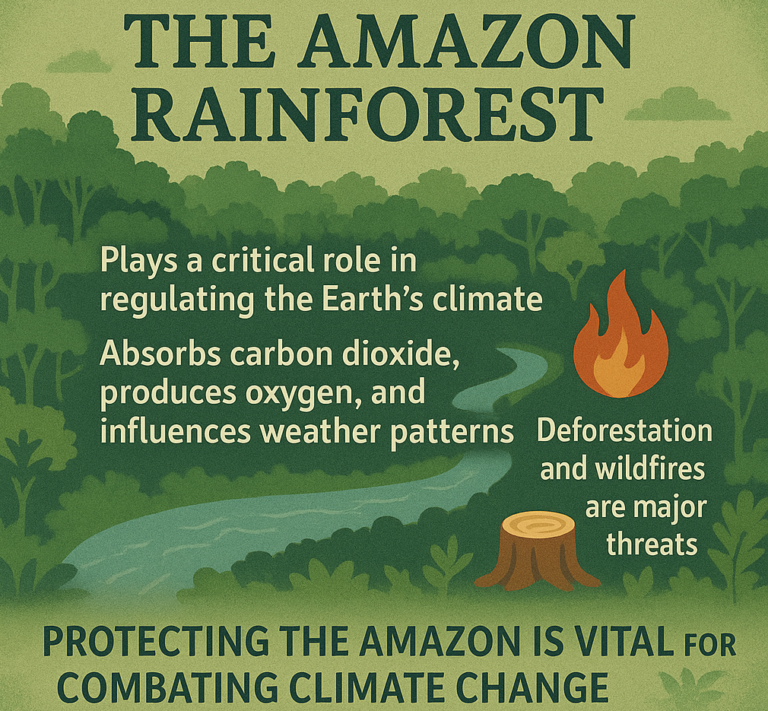Space Exploration
Space exploration is the science and technology of exploring outer space, and it involves sending spacecraft, satellites, and even humans to study planets, stars, and galaxies far beyond Earth. Let’s take a closer look at some of the key space agencies and missions that have helped us explore space: ISRO, NASA, SpaceX, and Mars Missions.
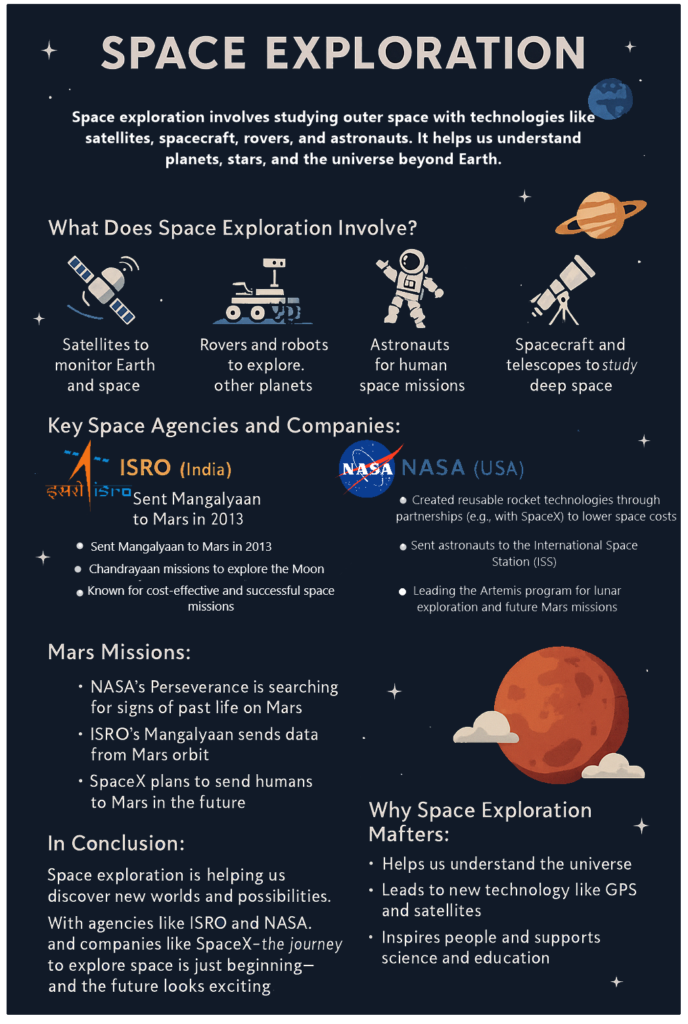
What is Space Exploration?
Space exploration involves traveling beyond Earth to learn about space. It includes sending:
- Satellites to study Earth, weather, and space.
- Robots and rovers to explore other planets and moons.
- Astronauts to travel to space for scientific research.
- Spacecraft to study stars, galaxies, and the universe.
ISRO: India’s Space Agency
ISRO stands for the Indian Space Research Organisation. It is India’s government space agency and has achieved many impressive things in space exploration.
- Key Achievements:
- Mars Orbiter Mission (Mangalyaan): In 2013, ISRO became the first Asian country to reach Mars with its spacecraft, Mangalyaan. It made India the fourth country to reach Mars, after the United States, Russia, and Europe.
- Chandrayaan Missions: These missions are focused on studying the Moon. Chandrayaan-1 (2008) discovered water on the Moon. The more recent Chandrayaan-2 (2019) aimed to land on the Moon’s south pole, although the lander lost contact during landing.
- PSLV Rocket: ISRO’s Polar Satellite Launch Vehicle (PSLV) is known for launching satellites into orbit, including many for other countries.
- Why it’s important: ISRO has shown how space exploration can be done efficiently and affordably. It is helping other countries with satellite launches and space missions, and has made India a global leader in space technology.
NASA: The United States Space Agency
NASA stands for the National Aeronautics and Space Administration. It is the United States’ space agency and is one of the most well-known in the world.
- Key Achievements:
- Apollo Moon Landings: NASA is famous for landing astronauts on the Moon. In 1969, the Apollo 11 mission made Neil Armstrong the first human to walk on the Moon, saying, “That’s one small step for man, one giant leap for mankind.”
- Mars Rovers: NASA has sent several rovers to Mars to study the planet. The most recent is Perseverance, which landed on Mars in 2021 to look for signs of ancient life and collect samples.
- Hubble Space Telescope: Launched in 1990, this telescope has allowed us to see incredible pictures of space, including distant galaxies, stars, and nebulae.
- Why it’s important: NASA has led many pioneering missions in space, including human spaceflight, robotic exploration, and scientific discoveries. It continues to inspire people around the world with its space missions.
SpaceX: The Private Space Company
SpaceX is a private space company founded by Elon Musk in 2002. Unlike government agencies, SpaceX is a commercial company that works to make space travel cheaper and more accessible.
- Key Achievements:
- Reusable Rockets: SpaceX has made history by developing rockets that can land back on Earth after launching into space. This makes space travel much cheaper because the same rocket can be used multiple times.
- Falcon 9: The Falcon 9 is a rocket developed by SpaceX. It has been used to launch satellites, cargo to the International Space Station (ISS), and even crewed missions.
- Crew Dragon: SpaceX developed the Crew Dragon capsule, which is used to send astronauts to the ISS. In 2020, SpaceX launched astronauts for the first time on its Crew Dragon spacecraft, making it the first private company to do so.
- Starship: SpaceX is also developing Starship, a spacecraft designed to carry humans to the Moon, Mars, and beyond.
- Why it’s important: SpaceX is making space exploration more affordable and exciting, with plans to send humans to Mars. It’s also helping NASA by sending astronauts and cargo to the ISS.
Mars Missions: Exploring the Red Planet
Mars is one of the most fascinating planets in our Solar System, and many space agencies are working to explore it. Mars has water, seasons, and a day similar to Earth’s, making it a prime target for exploration.
- NASA’s Perseverance Rover:
- In 2021, NASA’s Perseverance rover successfully landed on Mars. Its goal is to find signs of ancient life and collect soil and rock samples that may be brought back to Earth.
- Ingenuity: Perseverance also carried a helicopter named Ingenuity, which became the first aircraft to fly on another planet. It’s helping scientists understand the atmosphere of Mars.
- ISRO’s Mars Orbiter (Mangalyaan):
- As mentioned earlier, ISRO’s Mangalyaan mission made India the first Asian country to reach Mars. It continues to orbit the planet, sending valuable data back to Earth.
- SpaceX’s Mars Mission:
- SpaceX, led by Elon Musk, is planning to send humans to Mars. Their spacecraft, Starship, is being designed for long-duration missions, potentially making human colonization of Mars a reality in the future.
- Why Mars? Mars is considered the most likely place where humans might live one day, thanks to its similarities to Earth. Scientists are trying to learn if life ever existed there and how we could survive on the Red Planet.
Why Space Exploration is Important:
- Understanding Our Universe: Space exploration helps us learn more about the universe, how it started, and how it works.
- Advancements in Technology: Space missions lead to new technologies that can improve life on Earth, like GPS, satellite communications, and medical advancements.
- Inspiration: Space exploration inspires people to pursue careers in science, technology, engineering, and mathematics (STEM). It also brings people together to dream big and achieve the impossible.
- The Future of Humanity: By studying other planets, we learn about the potential for life elsewhere. Mars, in particular, might be a target for future human colonization if Earth’s resources ever run out.
Conclusion:
Space exploration is an exciting and important field, driven by both government agencies like ISRO and NASA, as well as private companies like SpaceX. From landing on the Moon to sending robots to Mars, space exploration is teaching us about our universe and paving the way for a future where humans might live on other planets. Whether it’s studying distant stars, landing on Mars, or making space travel more affordable, these missions help us explore the unknown and make amazing discoveries.

